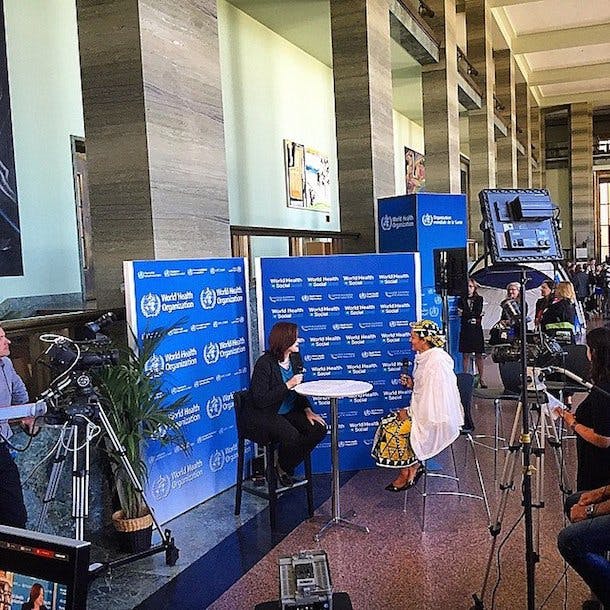The World Health Assembly (WHA) is the world’s premier health policy meeting, which guides the global health priorities around the world. This year, the United Nations Foundation and the World Health Organization (WHO) once again partnered to produce World Health +SocialGood, a daily webcast that brought together health experts from the Assembly to discuss the top issues on the agenda. This hour-long live stream gave a global digital audience the opportunity to engage on major topics affecting health and well-being around the world. The week was full of inspiring and insightful moments, so we’ve picked a few of our favorites to share with you.
 (Photo by Eric Porterfield, UN Foundation)
(Photo by Eric Porterfield, UN Foundation)
1. What’s next in global health agenda with Amina Mohammed
As we transition from the Millennium Development Goals (MDGs) and move toward the new development agenda with the Sustainable Development Goals (SDGs), the global community is all asking the same question: “What’s next in the post-2015 era?” Amina Mohammed, Special Advisor of the United Nations Secretary-General on Post-2015 Development Planning, joined World Health +SocialGood on the first day to talk about the process for developing the new strategy, what to expect, and how we can achieve the new goals that will be set. Watch it here. (Note: This segment starts at 40:00)
2. The Ebola outbreak and global response with Dr. David Nabarro
The Ebola outbreak that has devastated West Africa, taking over 10,000 lives and infecting over 27,000 people, was a major focus at the World Health Assembly. UN Special Envoy on Ebola Dr. David Nabarro provided a fascinating overview of the outbreak, the response efforts, and the current situation. Watch it here. (Note: This segment starts at 00:30)
3. How to amplify YOUR voice with youth advocates from around the world
Early in the week, online viewers sent in comments wanting to know more about how they could get involved in setting health priorities for the global health agenda. We listened! On day four of the program, youth advocates from Egypt and Tanzania talked about how to engage individuals from every country in the process of setting health priorities, ensuring that those issues that are most important in their communities are amplified on a global stage. Watch it here.
4. Improving health for women, children, and adolescents
The world is reducing the deaths of women and children faster than at any time in history, and as a result 6.4 million fewer children died in 2013 compared to 1990. The Global Strategy for Women’s and Children’s Health, launched by the UN Secretary-General in 2010, has been hugely successful and an updated version will be released later this year. Now, as we transition from the MDGs to the SDGs, women’s, children’s, and adolescents’ health must remain at the center of the global health dialogue in order to help finish the MDG agenda. On day three of World Health +SocialGood, speakers talked about what’s been accomplished so far, what the updated strategy will involve, how it will be funded, and how that work will impact women and children in their communities. Watch it here. (Note: This segment starts at 49:30)
5. Responding to severe, large-scale health emergencies
In the wake of the Nepal earthquake, the Ebola outbreak, and increasing attacks on health workers in conflict zones, responding to and preparing for health emergencies presents a major challenge for WHO and its partners. On day three of World Health +SocialGood, a panel came together to talk about strategies that can help better prepare countries for these challenges, the current situation in Syria and pressing needs for that country, and how to better protect the health workforce when it is targeted. Watch it here. (Note: This segment starts at 10:05)
—
Want more? Not to worry, we have put together a full YouTube playlist with all the segments from World Health +SocialGood and there are still more to come in the next week. Check out the all discussions from the week here.



 View All Blog Posts
View All Blog Posts